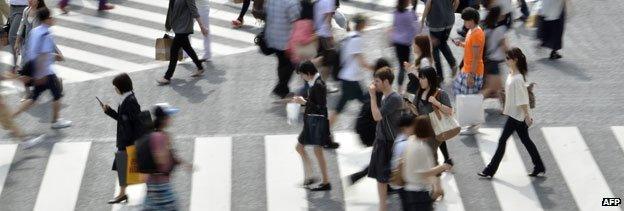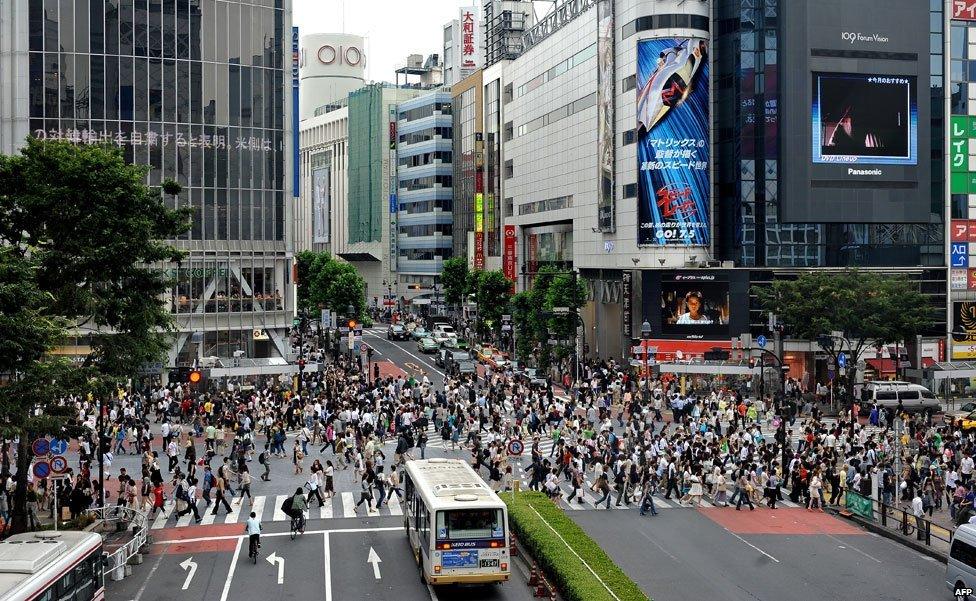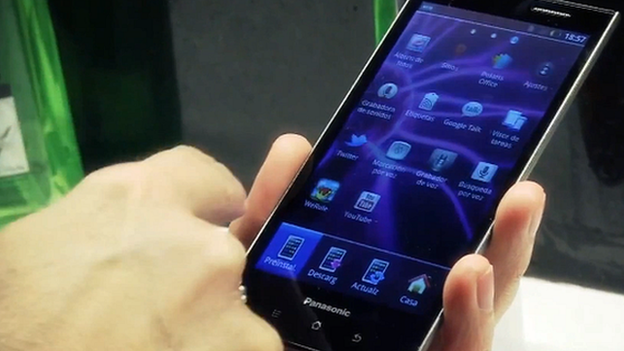Japan enters the era of smartphones and 'dumbwalking'
- Published

Japan has been a late adopter when it comes to smartphones, but it's catching up quickly - already more than half the population owns one. But Tokyo is a crowded city, and warnings are being issued about the risk of mass collisions among phone-using pedestrians at one busy crossing.
It's 5pm on a Friday and I'm standing in a coffee shop above Shibuya crossing - one of the most famous intersections in the world.
It's a place where every two minutes, more than a thousand of Tokyo's smartly dressed commuters and fashion-making teens gather at eight points, ready to cross - then rush straight for each other.
It looks like they must crash, this sea of people, but they swerve and swing around each other, like dancers pirouetting, and they all get to the other side safely.
It's awe-inspiring, so much so that at times it leads people - including myself - to say rather trite things about how it's the perfect symbol of Japanese society: the many individuals acting together for the greater good.
But the reason I'm here, isn't to gawp in amazement, it's in the hope that I'll see people crash.
I want businessmen ploughing into each other, their umbrellas flying off their arms, and immaculately uniformed schoolchildren tripping up grannies.
Why may I get to see this now, when I wouldn't have had the chance even a year ago? It's very simple - smartphones.
Smartphone use is booming in Japan. In 2012, only about a quarter of Japanese used them, most being perfectly happy with their everyday mobiles.
But people have now realised smartphones are just too useful to ignore, especially because they can be used to read newspapers and manga, the Japanese comics which have gone global, without straining your eyes.
More than half of all Japanese now own a smartphone and the proportion is rising fast.
But with that rise has grown another phenomenon - the smartphone walk.
It's that glacial pace people only adopt when they're staring at a phone screen - their head down, arms outstretched, looking like zombies trying to find human prey.
Researchers here have found people don't just walk more slowly when they're on smartphones, their field of vision is reduced to 5% of what it should be, and some are worrying what this means for Shibuya.

Recently the Japanese mobile giant NTT Docomo released a simulation, external of what would happen there if everyone crossing was doing the smartphone walk.
There would be more than 400 collisions every time, it said, and most likely just 36% of people would get across. Orderly Japanese society as we know it, would be at an end.
Surprisingly, the person who seems most annoyed about this phenomenon is an American.

The diagonal crossing at London's Oxford Circus is modelled on Shibuya
Michael Cucek is a consultant who has lived here for more than 20 years. In his spare time, he writes a popular political blog called Shisaku, external that has recently been littered with posts about what he calls "dumbwalking".
I met Michael this week in Sugamo, a part of Tokyo popular with pensioners who, understandably enough, all walk incredibly slowly.
He told me dumbwalking probably wouldn't be a long-term problem.
Japanese phone etiquette is in fact better than anywhere else in the world - hardly anyone speaks on their phones on trains, and teenagers wouldn't dare broadcast music out of one.
If things got truly bad at Shibuya, the police would just start patrolling the crossing shouting at people to look up. Until that does happen, though, he's going to carry on ranting.

But really, is the smartphone walk such an issue? There's only one way to find out. So I leave the coffee shop, head down to the crossing and start typing an email, promising myself I won't look up until I get to the other side.
I'm soon surrounded by people and only realise the traffic has stopped and it's my time to cross when they start streaming past me.
As I step forward, the experience quickly becomes unnerving - legs jump in and out of my vision without warning, while shopping bags fly towards my face before being pulled away at the last moment.
I'm sure I'm going to get hit, but after a few seconds I relax. It's OK. Everyone's reacting for me.
And then I realise there's two people who aren't. They're directly in front of me and they're not moving out of the way. I try moving left, but they do too. I swerve to the right, but they do too. We're stuck. It's so silly I have to look up.
I expect to see two dumbwalkers just like me. But instead I find a young couple, very much in love and very much refusing to let go of each other's hands just to get around an inconsiderate idiot on his smartphone.
The girl gives me a look of such contempt that I quickly apologise and rush round them. That look was enough to ensure I'll never be dumbwalking again.
How to listen to From Our Own Correspondent, external:
BBC Radio 4: Saturdays at 11:30 and some Thursdays at 11:00
Listen online or download the podcast.
BBC World Service: Short editions Monday-Friday - see World Service programme schedule.
Subscribe to the BBC News Magazine's email newsletter to get articles sent to your inbox.
- Published4 September 2013

- Published12 August 2013
- Published12 May 2014
